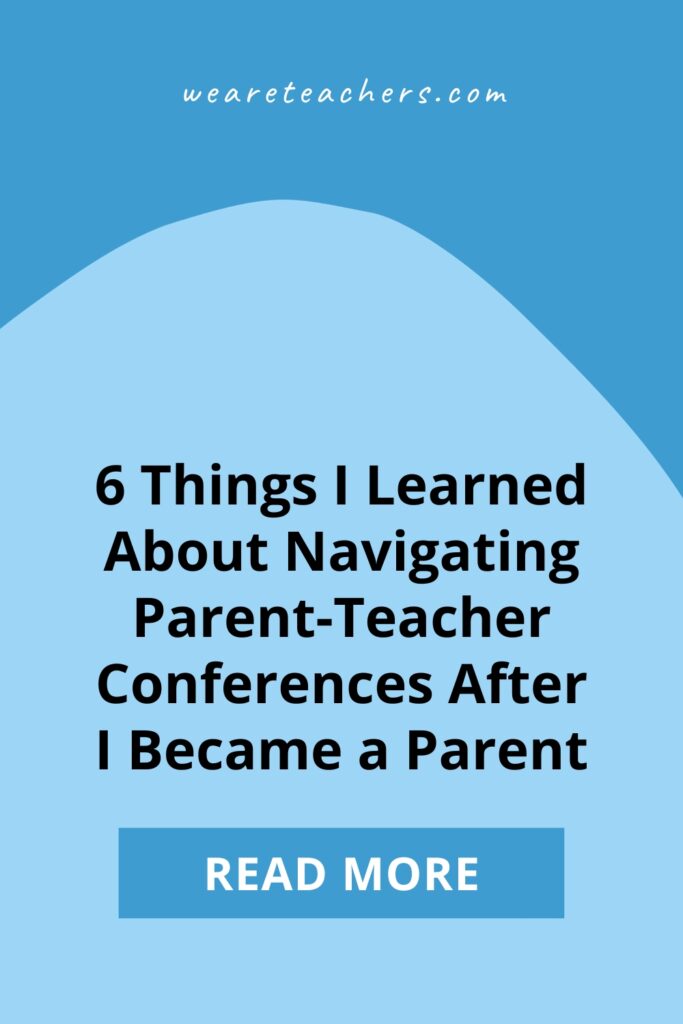When I started in my first classroom teaching position straight out of college, I had a lot of ideas about family engagement. Few of them were about what it was actually like to be the parent sitting across from me at conferences.
Fast-forward a couple decades and now I’m a parent of five kids. I’ve spent many conferences on the other side of the table (or, for a few years there, the Zoom room). If I could offer my new-teacher self some advice for navigating parent conferences, here’s what I’d say:
1. Please start by letting me know you like (or at least know) my kid.
It doesn’t matter whether you’re meeting with a super-supportive parent, a helicopter parent with propellers whirring, or someone in between. Parenting is harder than a lot of us expected, and it’s a big deal to send your kid into someone else’s care each day. Parents will feel more at ease if they feel a connection with you and know you have a connection with their child.
Yes, that clock is ticking on your meeting, but it’s always worth the time it takes to open the conference with a specific positive comment or anecdote that gives a glimpse into a child’s school life. Our family’s beloved preschool teachers brainstorm a list of adjectives about each child, which they share to start each conference. I treasure those lists and the sentiments behind them. When a conference begins with acknowledgement that yes, my child is earnest and funny and smart, and YES, their teacher actually knows them, it makes the entire conversation feel more comfortable, whether the next items on the list are successes or struggles.
2. Set a meeting agenda together.
When navigating parent conferences, it’s most productive to have a clear agenda that meets everyone’s needs. I remember preparing pages of notes for conferences as a new teacher, only to realize when the time slot was up, we hadn’t talked about any of it because we’d gone down a tangential rabbit hole. I’ve also gone into my own kids’ conferences with a list of questions in mind, and haven’t been able to get a word in as the teacher auto-launched straight into a list of topics that didn’t match my priorities.
Check in about your anticipated agenda before you dive in. Have a framework in mind, but be flexible enough to personalize the conference for each family.
I especially appreciate when teachers reach out to ask what I hope to talk about at a conference. Reflecting solo helps me, as a frazzled parent, arrive ready for a focused conversation. Bonus points if I can look at my kid’s work to be discussed in advance. That way I’m not trying to laugh over his narrative about a baseball game and listen all at once.
3. Build in time for listening too.
I got better at this the longer I taught, but as a parent, it rings even truer. If you’re losing your voice after an afternoon of conferences—I admit, I often was—maybe you’re talking too much. You have a unique perspective on each student as a learner, and that’s crucial for parents to hear. They have a broader view of their children than you do, over more time and in different contexts. That’s important for you to hear about too. Leave space to ask parents questions like “Does this fit with what you see at home?” and “Does this feel like something new for your child or the continuation of a pattern?” Then wait, and let them talk too.
It’s helpful to use what you know—or find out—about each family to frame your conversations. At my fourth kid’s kindergarten conference in a few weeks, I don’t need a full rundown on developmental skills for 5- and 6-year-olds. We can get straight to the point about where my daughter is at. I can even handle some joking about her quirks. But please, middle school teachers, kindly give me all your sage advice. Talk me through handling my oldest son’s wild tween emotions. Tell me how to help him stay motivated to complete long-term projects. Plus, make me feel OK about generally having no clue what I’m doing at this new parenting stage.
4. Plain language, please!
Educational jargon and vague platitudes have no place in a parent conference. Give it to me gently, but please don’t minimize or hedge.
Parents need help accurately picturing their child’s behavior or performance in the context of school. I ask my kids often about school, but they are not reliable reporters. They exaggerate or downplay information based on their mood and what’s important to them. Plus, most conversations happen at bedtime, when they’re unloading all the day’s woes and everything gets an extra shot of drama. A quick explanation of a learning target or classroom routine, or showing something concrete like the actual book you used for a reading assessment, grounds our conversation in a shared reality.
It’s extra important to spell out a child’s challenges for families. It’s essential to share an exact problem behavior—what a child did, said, etc.—and what you hope they will do differently next time. I can’t help you much if all I’ve got when I talk to my kid is, “It sounds like you might have said something unkind to someone else last week.” Ditto for academic concerns. Saying, “Mrs. X. wants you to work harder at reading” to my kid is not going to get us anywhere. The more specific you can be on what you hope my child will do next—whether it’s keeping their hands to themselves in line, not rolling their eyes at peers’ comments, doubling down on practicing reading words with silent e, or including more key details in a book summary—the better I can support the work ahead.
5. Help me make sense of data.
It’s always important to have objective data on hand when navigating parent conferences, whether that’s assessment scores, progress-monitoring records, or work samples. But what’s more important than having data available is being prepared to talk about it in a straightforward way. I will respect and appreciate you walking me through what that composite score, reading rate, or entry on a writing rubric really says about where my kid is now and where they need to go.
6. End with clear action steps.
Parents think about the big picture for their kids, and the very small picture too. (“Did he brush his teeth this morning?” “What time is soccer practice?” “Is he happy?”) With all that swirling around my head, the best conferences wrap up with a handful of priority takeaways. I want to know your next steps at school and what I can do at home to help.
(Also keep in mind that sometimes after tough conversations, parents will need time to reflect or debrief with a neutral party. It’s OK to call a conversation unfinished and end a conference with a plan to talk again.)
Above all, kindness first.
Once, as a new teacher, I tried joking with a parent about her daughter’s role in a clique. Definitely aim for a collegial ease when navigating your parent conferences, but know that when it’s a mama or papa bear listening to information about their precious cubs, any hint of sarcasm or perceived eye roll is amplified. This mother ended up contacting me after the conference, upset that I “didn’t like her daughter.” We met again and reframed the conversation. By the end of that year, she was one of my biggest champions, and thanked me for being honest about my observations. We probably could have gotten there with less angst, though, had I taken more care with my initial delivery.
As I select my times on all the online sign-ups this year: Busy teachers marching through an endless conference schedule, I see you. Parents for whom just one name on the list fills your world, I see you too. Let’s pull our student-sized chairs a little closer this conference season to make the most of our minutes together.
Plus check out our Parent-Teacher Conference Guide with practical tips on scheduling and preparing, as well as what to do during and after conferences and how to answer tough questions.
For more articles like this, sign up for our free newsletters.


